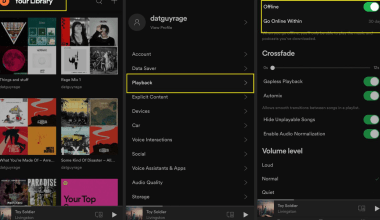Studying effectively requires focus and concentration, and the right music can make all the difference. A well-curated study playlist can help you stay motivated, block out distractions, and enhance your cognitive performance.
Whether you’re cramming for exams or tackling a long-term project, finding the right tracks to accompany your study sessions is key. This blog explores how to create the perfect study playlist, including tips, recommended genres, and track suggestions to help you stay on track.
What Makes a Great Study Playlist?
A great study playlist is more than just a random collection of songs. It’s tailored to enhance focus and maintain a calm yet stimulating environment. Key characteristics of an effective study playlist include:
- Non-Distracting: Avoid lyrics or overly complex melodies that might pull your attention away from your work.
- Consistent Tempo: Steady, moderate tempos help maintain focus without being overly energizing or too relaxing.
- Genre Variety: Different genres suit different tasks—experiment to find what works for you.
- Customizable: Your study playlist should evolve with your preferences and study needs.
Popular Genres for a Study Playlist
Choosing the right genre is crucial. Here are some of the best genres for creating a productive study playlist:
1. Classical Music
Classical music is a timeless choice for studying. Its intricate compositions stimulate the brain without being intrusive.
- Recommended Artists: Bach, Beethoven, Mozart.
- Top Tracks: “Clair de Lune” by Debussy, “Canon in D” by Pachelbel.
2. Lo-fi Hip-Hop
Lo-fi hip-hop is a modern favorite for study playlists. Its chill beats and repetitive rhythms create a relaxed yet focused atmosphere.
- Recommended Playlists: “Lo-fi Beats” on Spotify, “ChilledCow” on YouTube.
- Top Tracks: “Snowman” by WYS, “Kiss the Sky” by Oatmello.
3. Ambient and Electronic
Ambient music provides a soothing backdrop for intense focus. Electronic tracks with minimal vocals also work well.
- Recommended Artists: Brian Eno, Tycho, Aphex Twin.
- Top Tracks: “Weightless” by Marconi Union, “A Walk” by Tycho.
4. Acoustic and Instrumental
Acoustic guitar and instrumental tracks are perfect for those who prefer a more organic sound.
- Recommended Artists: Explosions in the Sky, Ludovico Einaudi.
- Top Tracks: “Nuvole Bianche” by Ludovico Einaudi, “Your Hand in Mine” by Explosions in the Sky.
5. Jazz
Soft jazz, especially instrumental, provides a calming environment without becoming monotonous.
- Recommended Artists: Miles Davis, Bill Evans.
- Top Tracks: “Blue in Green” by Miles Davis, “Peace Piece” by Bill Evans.
How to Build Your Study Playlist
Creating your study playlist involves more than just picking songs. Follow these steps for the best results:
- Set a Goal
Identify your study goals. Are you reading, writing, or solving problems? Different tasks may require different types of music. - Choose the Right Tracks
Start with recommended genres and adjust based on your preferences. Add tracks that keep you motivated and focused. - Organize by Tempo
Structure your playlist to match your study flow. Begin with slower tracks for concentration, then shift to moderate tempos for productivity. - Test and Adjust
Experiment with your playlist during study sessions. Remove distracting tracks and add new ones to keep it fresh. - Use Streaming Platforms
Platforms like Spotify, Apple Music, and YouTube offer pre-made study playlists. Use these as inspiration or customize them to suit your needs.
Benefits of a Study Playlist
Incorporating a study playlist into your routine can offer numerous benefits:
- Improved Focus
Music helps block out background noise, allowing you to concentrate better. - Reduced Stress
Calming tracks can lower stress levels, making study sessions more enjoyable. - Enhanced Productivity
The right music keeps your energy levels consistent, preventing burnout. - Motivation Boost
Upbeat tracks can keep you motivated during long study sessions.
Mistakes to Avoid When Creating a Study Playlist
While music can enhance your study experience, certain mistakes can reduce its effectiveness:
- Including Distracting Songs
Tracks with catchy lyrics or abrupt tempo changes can break your focus. - Overloading the Playlist
Too many tracks can make the playlist overwhelming. Keep it concise and relevant. - Ignoring Personal Preferences
Everyone’s music taste is different. Choose tracks that resonate with you. - Not Updating the Playlist
A stagnant playlist can become boring over time. Regularly refresh your list with new songs.
The Science Behind Music and Study
Studies show that music can positively impact cognitive functions. However, the type of music and its volume play a significant role.
- The Mozart Effect
Classical music, particularly Mozart, is believed to improve spatial-temporal reasoning. - Alpha Brain Waves
Music with a tempo of 60 BPM can increase alpha brain waves, promoting relaxation and focus. - Personalization
Music’s effect varies from person to person. Tailoring your study playlist ensures it meets your needs.
Tools to Enhance Your Study Playlist Experience
Several tools and apps can help you create and optimize your study playlist:
- Spotify: Offers curated study playlists and personalization options.
- YouTube: Channels like “ChilledCow” and “Ambient Worlds” provide excellent study tracks.
- Brain.fm: Focused on functional music designed for productivity.
- SoundCloud: Discover unique tracks from independent artists.
Conclusion: Create Your Ultimate Study Playlist
A well-curated study playlist can transform your study sessions. By choosing the right tracks, experimenting with genres, and tailoring your playlist to your needs, you can boost focus, reduce stress, and enhance productivity.
Related Articles:
For further reading, explore these related articles:
For additional resources on music marketing and distribution, visit Deliver My Tune.






